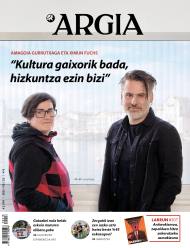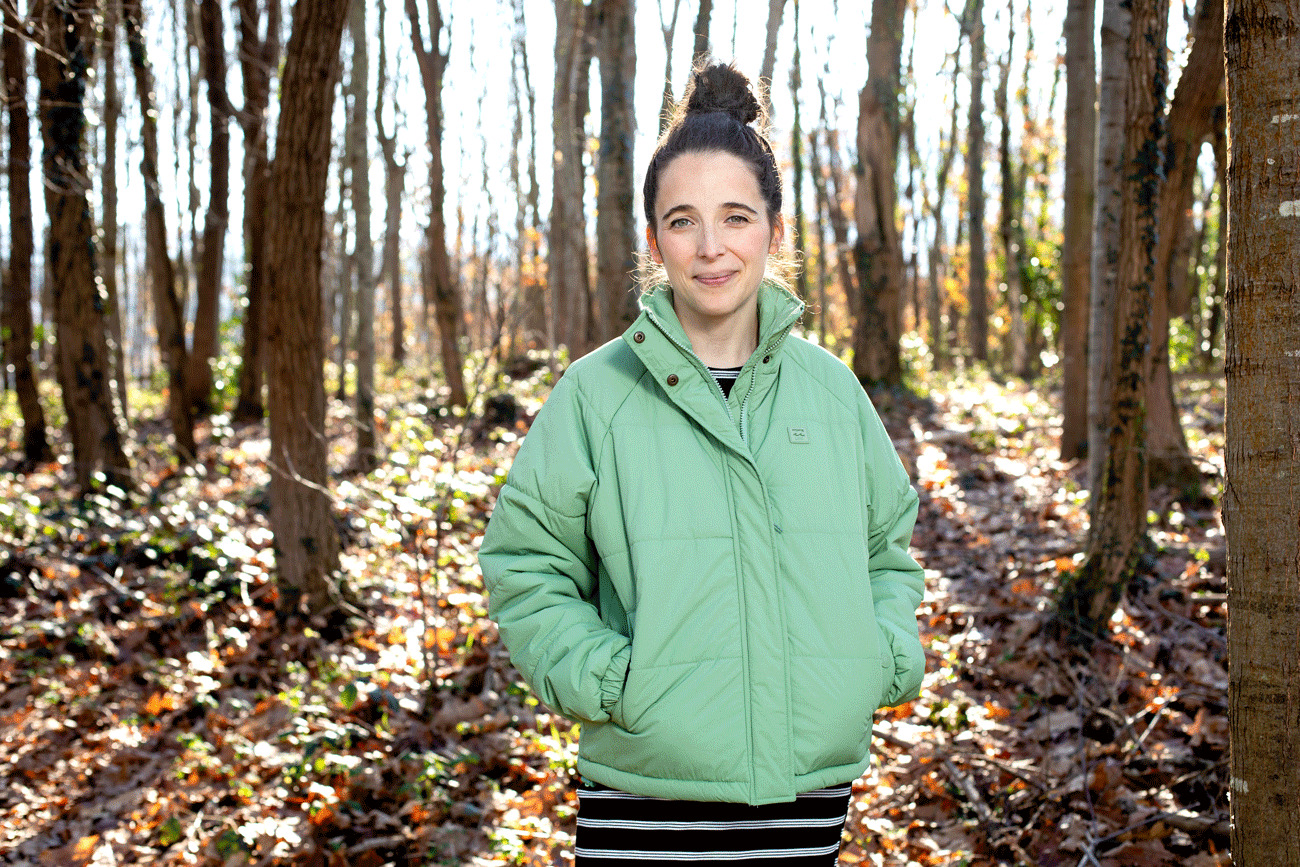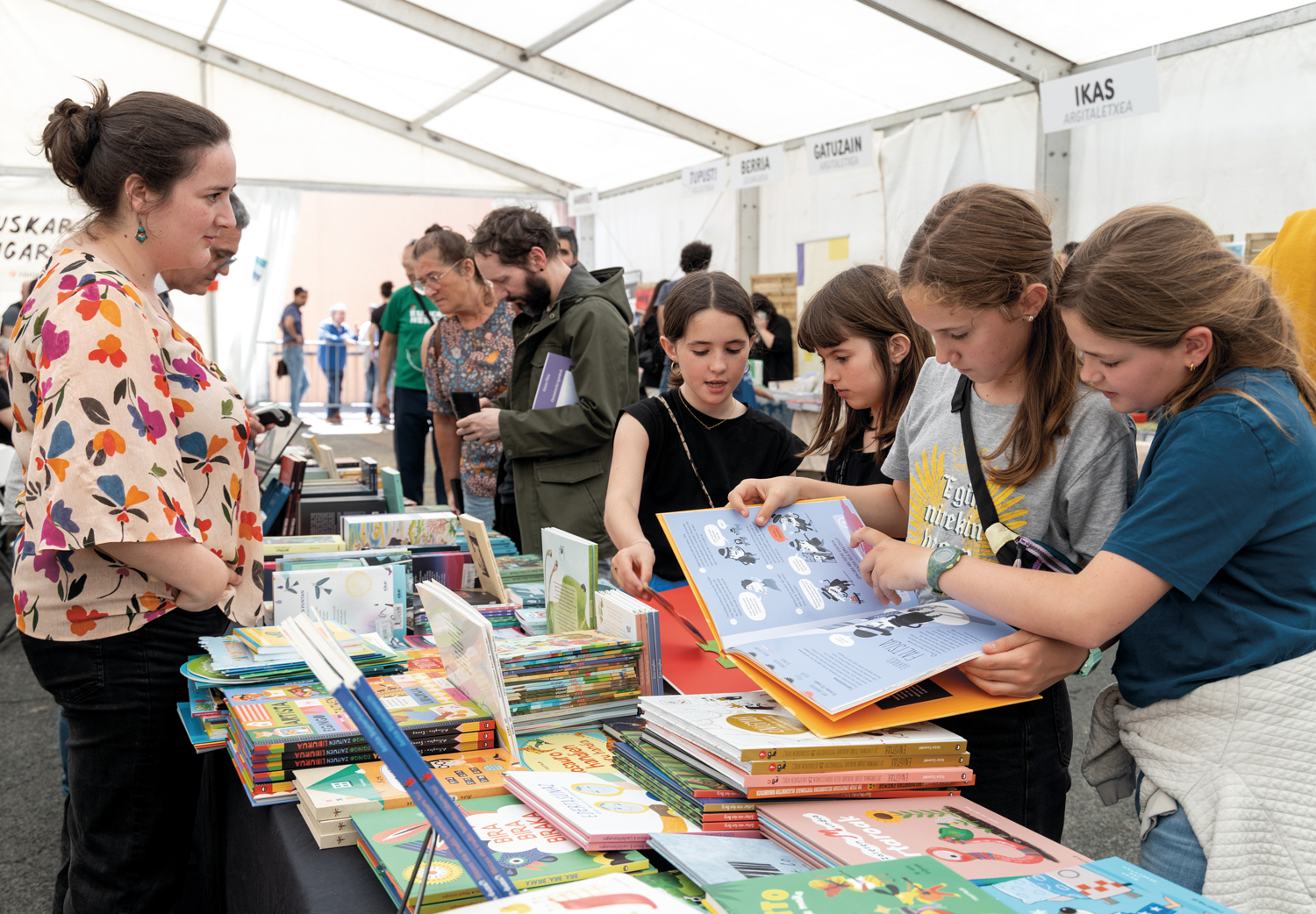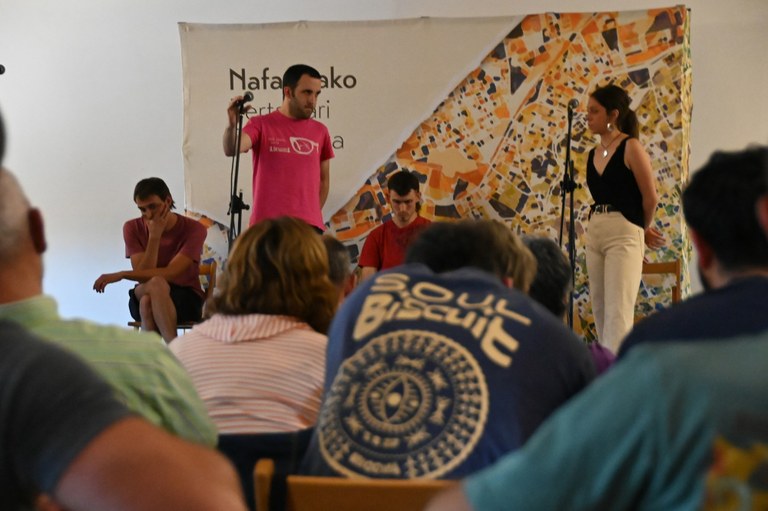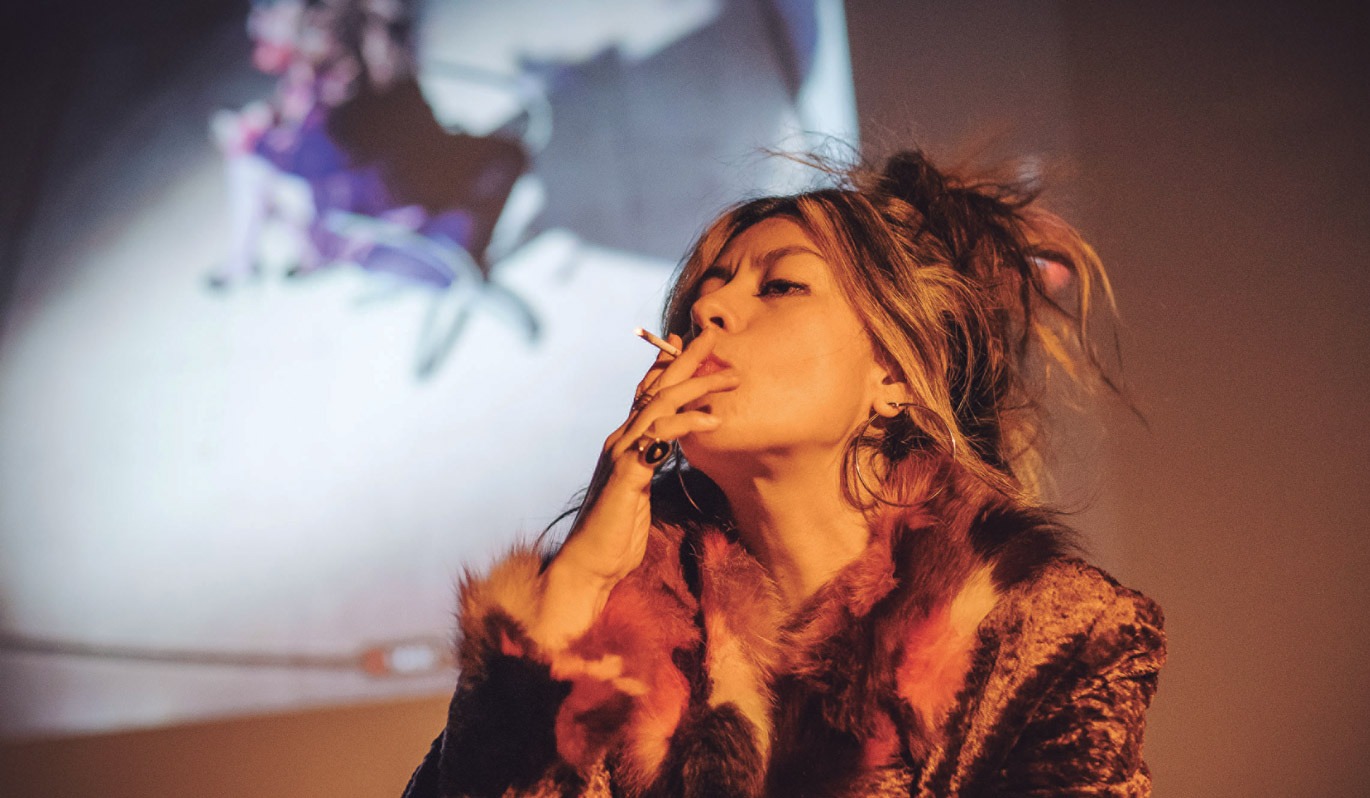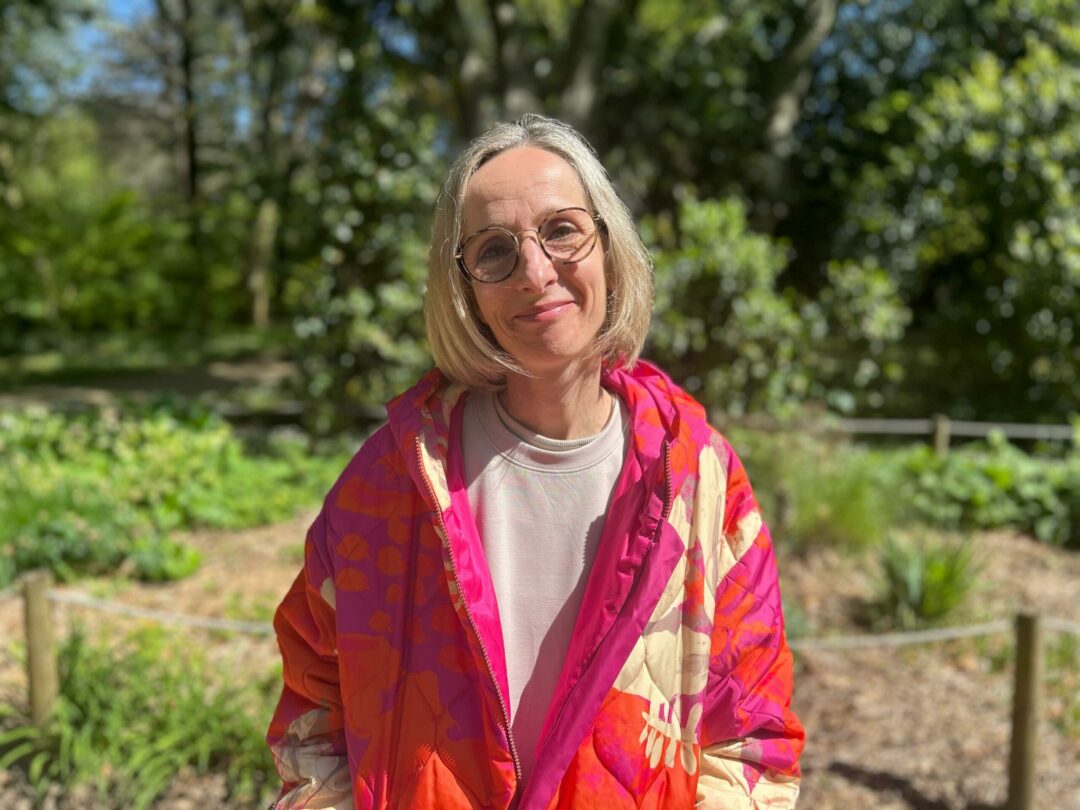"We've tried to be sympathetic, but that doesn't work for us"
- The Basque Book and Disco Fair in Ciboure will have its 6th edition this year. It will take place, as usual, on Saturday, June 7th, organized by the association Baltsan and the media LUZ. In the lobby, to talk about what is in the liver of creation, LAR and Basque Radio have organized a round table to reflect on a day full of light and darkness that is not often visualized but is happily expressed more and more times:Creating in Basque (dignified) with the title of Vive, in conversation Amagoia Gurrutxaga, member of Lanartea and Ximun Fuchs, actor, director and Axut! Founder of the collective. The radio program recorded in the studio is longer than this written version: listen here.

The following quote can set us the ideal umbrella. In an appearance before the Basque Parliament, Lanarte said:
Society does not see us as economic subjects. He has a rather romantic and bohemian image of us; believing that we live in the clouds, that applause and occasional rewards satisfy us. We are not workers in the eyes of most of our listeners, readers and buyers. And the administration does not give us the care and respect that our professional practice requires. We have rights, but the system can't shake hands.
What is Lanarte? When, how and why was it created?
More places to stay in Amagoia Gurrutxaga: The association was founded by artists who make culture in and out of Basque, usually veterans, because they saw a serious need. They discovered that a young writer, who was very popular at the time – what we would call “successful” in today’s society – could not afford to rent a room in his house in San Sebastián, which he shared, he did not win. “How is that possible?” they said. “He’s successful in society and he can’t afford his own room.” This friendly veteran
writer began to talk to nearby journalists—and to comment among the people, to other disciplines that had passed, to carry out specific studies of the sector... That’s how they did it around 2017 and 2018. The first major meeting took place in 2019 and was registered as a non-profit association in 2020. From the beginning they expressed their vocation to function as trade unions.
That the founders of the Basque language have rights and that the administration does not know how to intervene... Preseski, Ximun, axing this reality, Axut! Did you create a collective with the aim of developing theater, knowing that Basque creations are less favored?
Pictures of Ximun Fuchs: We created the collective in 2018 with different objectives, but mainly with the idea that if we want to give strength to the theater that lives in Basque, we have to do it in full Basque. We were speaking Spanish before, but also in French. Before we were aware that there is a system of discrimination in our country, throughout the territory, with nuances; we had to take the step.
At Axut! we have three axes for the work: creation, artistic education – we have a person dedicated to it, working with schools – and we call the third axis “urbanism”. Our creation needs our own equipment, and the collective we created to build it, to try to get things done, even though we are working against a wall all the time.
.jpg)
In an article written for THE LIGHT, you said, Ximun: “Basque culture is not a topic, but an announcement.” What kind of features does it have?
More places to stay in Fuchs: First, we need to define the culture. I’ll talk about what it means to me: the permanence of our knowledge, the transmission, how we live together... The living conditions of language are based on culture. If the culture is sick, the language cannot live. There would be no model, because art creates models for our lives. I have learned to kiss first in the cinema, watching movies, and then if I don’t see a kiss in the cinema in Basque, I will know how to kiss in Spanish or French. We are all monkeys, we are built by imitation. So, when that’s not there, something similar to a ban is kissing, loving, feeling in Basque... We are banned, and the ban is still in effect. It does not happen in the same way as those stars of Franco or the French Republic, as it was seen in the Parassoro, but we are economically powerless, and being so, there is not much space between impotence and prohibition.
The real announcement is: to make numbers; so many spectators, so many children have seen such a thing. We are told that we do not open ourselves so much to the French, that we are not attractive; that is another announcement. The professor at my faculty in Bordeaux said that the Basque theatre stinks from the legs.
More places to stay in Amagoia Gurrutxaga: "We are talking about the loss of a cultural capital and we have very good creators"
Pictures of Gurrutxaga: Speaking of ads, let's talk about advertising. I think there's a lot of cultural policy out there. It is said that advertising touches people’s desires, that is the key to success. Bringing it to culture, my question is: in the cultural landscape that we have today, does this announcement show us the desire to make culture in Basque, to receive culture in Basque, to live, to be? In my opinion, no.
I remember what kind of wood the small farmers gave to the Basque Government in the past because they didn’t want to do macro production, they didn’t want to throw crap into their fields, they wanted to be sovereign... At a time when institutions were increasingly tightening up, when policies were being developed in favour of large businesses, the Government launched an announcement with the slogan “aupa!”. They seemed to love the villagers who were shrinking in their day to day lives. I have the impression that they do something similar with culture: they are always in favor of culture and Basque, but their daily practice is always the act of activating the impulse of the birthright.
In the form of an advertisement, the play Miñán is having a good poster; he has done an incredible job in the theaters. Ander Lipus is behind this, but we have recently heard that he is exhausted, needs rest, needs to reflect on what he is doing... It’s a very stressful situation in the theatre. Ximun, are these words familiar to you?
More places to stay in Fuchs: It's got a lot of wear and tear, yeah. Miñán will be by far the most performed work in the history of theater in Basque. I don’t know anyone who has done so many performances in France in this course, I don’t even know him in Spain. It was an event of Christ. Every ten to fifteen years, a play brings an entire community closer to the theatre. And, the theater group of Lipus, Artedrama, lives right. That's the reality. Any country that is fair would take care of them, but that is not the case here. And the Basque Country is not a poor country. Just do the road, if you want the AP-8, to see that there are fat companies, that there is money.
The Artedrama would have been eroded by these difficulties. But not in the form of companies, which are more extensive; like ourselves, many are working in the public sector, institutionally, and with young people. They have come here to the Northern Basque Country, often losing money. This is important to them.
We have the knowledge of doing it, we have always been willing to share it with all the institutions, they say yes, and the opposite direction is always taken. It turns its back on Basque culture and theatre. This is what has happened with the cultural reform of the Basque Country, for example. [Former Minister of Education Jean-Michel] Blanquer dreamed that the Urban Centre has put into operation: it has been forbidden to support Basque creation from schools. But that didn’t lead to a huge upheaval in the industry. Because each one of us in his own thing, each one separately, can't hold on. This creates a problem for us: that we can’t achieve a relationship of strength. We're screaming like crazy naked in the desert, and it doesn't have much influence. The erosion, which we were talking about, has also come from there.
Pictures of Gurrutxaga: When I’ve been talking to people from other associations and disciplines since work, we’ve come to this conclusion: atomization is one of the consequences that precariousness often brings. That each one is doing what it takes to save his own ass, and sometimes even pulling his elbows out and interfering with each other. Everything leads you to save your own, and when we realize that the situation is about to explode, we see ourselves alone. These are the dynamics that are promoted from the institutions, they are interested in not having good conditions in terms of creativity, being intertwined, and from there spreading criticisms of the system. That’s what needs to be broken, but it’s also the hardest thing to break: people need to eat.
.jpg)
If you need something to live for, that’s money. Lanarte recently conducted a survey on the I Working and Living Conditions of Basque Artists. The so-called survey. Among those who have completed the questionnaire, almost seven out of ten generate it only in Basque, and those who do it in Basque, but mainly in Basque, added to the previous group, the percentage is 92%. With this sample, a main headline: artists who work in Basque have a monthly salary of 1,027 euros. That is, 12,073 euros per year.
Pictures of Gurrutxaga: Precariousness is not exclusive to those who speak Basque, but since we created Lanarte we knew that those who speak Basque are even more precarious. We began to explore the living conditions of workers in the sector, with special emphasis on the language variable, and we realized that there was no data or figures, it is clear why: there is a marked interest in the elimination of the language variable.
Pictures of Ximun Fuchs: "It's the same; we're screaming like crazy naked in the desert and it doesn't have much influence."
The Government has recently published a survey on musicians, who have spoken with large companies or employers in the sector and then with musicians about their working situation. They asked them almost everything we asked, except for the language in which you sing. Age yes, origin yes, gender is also asked... But not the language.
In the South Basque Country, before the Franco regime, it was the theatre that united the people, which had an enormous weight in favor of the language. Since then, when the Government began to grant aid, it has always supported the Basque and Basque works. All this has led us to the situation where the performing arts often do it in Basque and Basque, because it is characteristic of their discipline, and in some municipalities they are told, “ah, do you also do it in Basque? We’re going to program you so that everyone understands.”
The majority of programmers are now municipalities, and they are increasingly entering into market logics to see how many spectators, listeners or whatever each one has. As a public entity they should not be involved in this; programming should not mark the sales of tickets.
More places to stay in Fuchs: A half-corrupt belief, though. Nobody does the Miñan numbers, not even in other languages. It is a prejudice that they promote, or ignorance, neglect, idleness... If you can't get the audience to the theater, as a programmer, you're doing things wrong. It is the organizer’s job to bring in the viewer, not the creator.
Pictures of Gurrutxaga: You know their explanation: “Artists should also be self-critical.” This corrupt belief, selling what is made in Basque as if it were of inferior quality, as if it did not interest the people...
.jpg)
Another significant fact in the survey that we have mentioned is that one in three has planned to abandon artistic practice in the last year. Among them are those who are working in a more amateur way, but taking those whose creation is the main occupation, the abandonment of the activity has been thought by almost half. It's really serious.
Pictures of Gurrutxaga: We are talking about the loss of a cultural capital and we have very good creators. We must take into account that the average number of years of career of those who have completed our survey is more than 22 years old, that is, half of those who have spent many years in this field have thought about leaving their job in the last year. The erosion among those who have responded that they are “well” is also very high. I don’t know what people think, that creators earn money, that artists don’t hit debts... Artists who appear mainly in public tell us that they do not have the opportunity to show, disseminate, make visible their work to the public. They are in constant processes of creation and promotion, on social networks, etc., so that later they cannot reach the people.
More places to stay in Amagoia Gurrutxaga: "It is not only precarious for those who speak Basque, but those who speak Basque are even more precarious"
In the Northern Basque Country, Ximú, if it is the so-called intermittent regime, to pay a month’s pay. It is also necessary to cover a minimum number of working hours, guarantee the number of performances... What is the situation for those who create in Basque? Difficult to reach the minimum?
More places to stay in Fuchs: Intermittent unemployment is a differentiated form of unemployment, adapted to those of us who work in public. The II. It was created during the World War and has been promoted ever since, because it has been thought that culture is a common benefit and, in solidarity, this benefit is offered to us. But what's going on? According to our calculations, in recent years thirteen places have been lost for the performance of plays.
You're saying it can't be filled just in the Northern Basque Country?
More places to stay in Fuchs: It's just impossible. It has become a terrible situation. He is a very good listener from the Basque Country North, accustomed to watching the theater, he is fond of it; but at the institutional level it is deplorable. The ecosystem is completely broken, by arrogance or arrogance, by neglect, I don't know. But he broke from it, he didn't come from Paris. It has been broken by the influence of nearby public policies, and a brain drain is taking place from Basque to French, as well as among artists in the sciences, etc.
Pictures of Manex Fuchs: "We must create a relationship of strength, taking Basque culture in the broadest sense"
The squares have been lost, which affects not only the creator, but also the viewer.
More places to stay in Fuchs: As a result, we all become mentally disabled. We no longer have the ability to connect our emotions and thoughts. We educate our children by saying “it’s okay to speak Basque”, but we don’t give them the skills to do so. There will be no more breathing zones, they have been lost. Thank goodness if the dialect keeps it intact, the citizens get it, you can talk about liberties, horseback riding sometimes... But it’s the same: I’ve gone to see the liberation and people speak French around it.
The institutions here, with their right hand, are returning to dark times. I think it is not a problem of the creators, but of the citizens. Right or left, it’s the same: I’m not able to say what the political project of each of the left and right is on a cultural level. They all turn their backs on us. Faced with the imposition of language, there is always the fear of losing votes, or of enraging a political alliance. And in the meantime we collect fire, because the Euskarafobos do not stop. Besides being a performer, I say as a citizen: don’t we want to think about this? How can I say goodbye to my mother, my father, when they die, if I don’t know how to say goodbye to a person in Basque, if I don’t have a model? I'll do it in French. The issue is already included in the colonization of our intimacy. France has policies to develop its own language and policy, and it has reached all areas: quotas, language... The whole thing. And yet they have a hard time developing their own. And we compete with them. It is unbalanced.
We also have our strengths, anyway. The Basque community is the first. The adherence is huge, the public follows us and it doesn’t matter what we do. There is hunger, there is desire, but the equipment is missing. And there's something we don't get: that these people come to some theaters. This is not because we do not achieve it, but because we have intensely internalized the colonized complex. We do not feel welcome in these places, the imaginary is not ours, nor the indirect communication, how people are dressed, how things are expressed... It's meant not to be our place. These are the forces that France and Spain have to indicate to whom the precincts and temples belong.
.jpg)
On the other hand, with the Basque Country divided into three administrations, the issues of paper are very complicated for artists. This has been stated by the Labor Party.
Pictures of Gurrutxaga: And in the South Basque Country there are four haciendas, the municipalities have their models... The machinery of bureaucracy is growing, it is evident. As a complement to the survey we conducted, we conducted eighteen long interviews with highly experienced people in this practice, with a wide range of disciplines, to collect their experiences. Everyone was terrified of what kind of mastodon has become the wheel of bureaucratic demands. It's one of those things that takes people's sleep away.
Finally, when we talk about the lack of common policies - and what do you think the force should be put on?
Pictures of Gurrutxaga: I will mention several points and complete them later, in Ximu. It is necessary to make budgets first and foremost, and not to make a Guggenheim, but to improve the way of life of those who work every day, to make it viable. On the other hand, although they laughed at us at the time, we need the “Etxebide Institute”: the Government has the Institute for the Internationalization of Basque Culture, Etxepare, where artists from seven countries are included, as well as those who do it in Basque. Okay, it's great to look outside, but once you've looked inside. And finally, I would like to mention the quotas in the media. We have proposed to the institutions to put quotas in cultural programming, and they have responded that we are not “forced” to go anywhere. And I say that putting quotas is not forcing; you are betting on the Basque language.
More places to stay in Amagoia Gurrutxaga: "It's amazing what kind of mastodon has become the wheel of bureaucratic demands"
More places to stay in Fuchs: Budgets are needed, as well as infrastructures, there is no doubt, and I do not know how to legally project the thought associated with culture... I think it is necessary to start with education: every student should have the right to study at least one play, one film, weeks of poetry, bertsolarismo... every year. Twelve films a year, twelve shows. Always thinking about the Basque Country system. Apart from that, we need to build a differentiated cultural ecosystem that includes teachers, programmers, media, creators... Something stimulating and complementary, something simple. In programmes - and I also believe that it must be forced: as a right for citizens, there must be an offer. Then people will go to see it or not.
Pictures of Gurrutxaga: We must also pay attention to the tools we have today. We already have EiTB, but there is not yet a radio station to show the listener the works that are created in Basque. There are four forever over and over again. Who should guarantee my right if EiTB does not do it? We are in it, and you can see that there is not even a shred of excitement in the use of the tools that we have. When you propose, they also look at you as a Taliban: you are saying that we are a minority language, that we have to revitalize it, you recognize that responsibility and duty, but when you go from words to actions you lose yourself in the Bermuda Triangle.
More places to stay in Fuchs: We need to get out of the blue helmet symbol. We've tried to be sympathetic, but that doesn't work for us. We need to create a relationship of strength. Take the Basque culture in the broadest sense, unite all the agents that speak Basque, create an accumulation of forces and address the issue.
Unai Elorriagaren Francesco Pasqualeren bosgarren arima liburua izan da lehiako bigarren finalista.
Pond of Venice, year 452. Prompted by the Huns' invasion, several inhabitants of the interior of the Italian peninsula took temporary refuge in the swampy area. But the Lombard invasions came in a few years, and it would become a permanent home for those immigrants. It was a... [+]
Between January and May 2015, after finishing my studies at the age of 25, my friend Irati Astobieta and I toured Chile, Argentina and Uruguay as part of the Calabazan Wandering Project. Using the poetic tool of whispered poetry, we gave Basque poems from mouth to ear in the... [+]
A fund for the State of Israel has bought most of the macrofestivals in the Spanish state. I'm talking about To. Whether it’s a festival with a beach side driveway or a festival with tattooed hardcorettes, an exchange of 1,400 million euros to build homes in Israeli colonies in... [+]
The whore’s monologue in the madhouse
- The author(s): Franca Rame and Dario Fo.
- From the translator: Assisted by Xabi Martinez De Lezea.
- The actor is: Assisted by Laura Penagos.
- When: April 12th.
- In which: At the Atxulondo Cultural Center in... [+]









